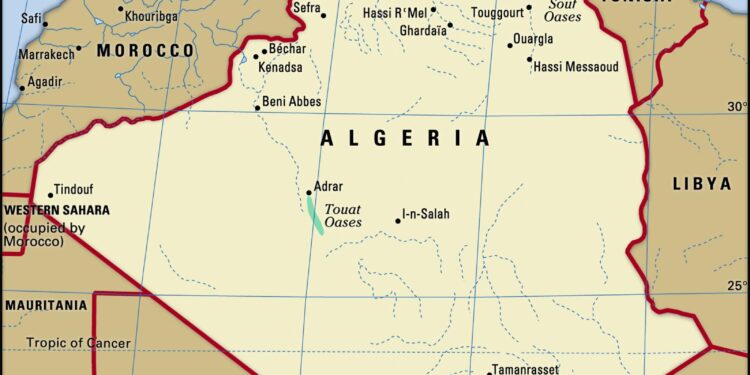AFRICA/ALGERIA – Rising Diplomatic Rift Between Algeria and Sahel Alliance Countries
Algiers, Algeria — A growing diplomatic dispute has emerged between Algeria and the three Sahel Alliance members—Mali, Niger, and Burkina Faso—amid escalating security challenges in the Sahel region. This discord unfolds amid a complex environment marked by rising terrorism, illegal migration flows, and competition over scarce resources. The strained relations have attracted global scrutiny as regional leaders seek pathways to restore cooperation while addressing persistent humanitarian crises. The evolving situation casts uncertainty over future regional collaboration efforts, with experts underscoring the urgency of unified strategies to confront the multifaceted threats destabilizing the Sahel.
Escalating Diplomatic Friction Over Security Challenges in the Sahel
In recent months, tensions have intensified between Algeria and its southern neighbors within the Sahel Alliance—Burkina Faso, Mali, and Niger—as concerns mount over deteriorating security conditions fueled by extremist violence. Algeria’s firm stance against foreign military presence in these countries has become a major point of contention. While Algiers champions sovereignty and cautions against external interventions that might exacerbate instability, leaders from Mali, Niger, and Burkina Faso advocate for increased international military support to counter jihadist groups operating across porous borders.
This divergence has sparked accusations from both sides: Algerian officials warn that foreign bases risk inflaming conflicts further; meanwhile, Sahel governments criticize Algeria for obstructing collective defense initiatives crucial to their survival amid surging attacks by armed factions.
Key issues fueling this diplomatic impasse include:
- Joint Military Operations: Calls from Sahel nations for enhanced coordinated counterterrorism missions.
- Foreign Military Presence: Algerian resistance toward hosting or endorsing foreign troops on its neighbors’ soil.
- Allocation of Counterterrorism Resources: Disputes regarding transparency and fairness in distributing aid aimed at stabilizing affected areas.
The absence of a cohesive approach threatens to deepen mistrust among these countries at a time when solidarity is critical. Given Algeria’s influential role as a North African powerbroker committed to regional peacekeeping efforts since decades past—including mediation roles during previous West African conflicts—the current rift represents a significant setback.
How Regional Instability Undermines Bilateral Relations & Cooperation Efforts
The diplomatic breakdown between Algiers and its southern counterparts underscores how fragile interstate relations are within an already volatile region grappling with overlapping crises. Divergent policies on border control measures alongside contrasting views on combating terrorism have eroded trust among these states.
This deterioration hampers not only direct diplomacy but also broader collaborative frameworks designed to tackle shared threats posed by extremist networks such as Jama’at Nasr al-Islam wal Muslimin (JNIM) or Islamic State affiliates active throughout parts of Mali and Burkina Faso.
Consequences extend beyond political disagreements:
- Diminished Security Collaboration: Reduced joint patrols along contested borders weaken collective defense capabilities against insurgent incursions.
- Eroded Economic Partnerships: Trade disruptions threaten fragile economies already burdened by inflation rates exceeding 10% in some areas according to recent IMF reports.
- Compromised Humanitarian Aid Delivery: Political friction delays essential assistance reaching displaced populations suffering from food insecurity worsened by climate change impacts.
As these nations navigate this precarious landscape marked by shifting alliances—including recent coups altering political dynamics—the imperative remains clear: rebuilding trust through renewed dialogue is vital for restoring stability across West Africa’s most vulnerable zones.
Strategic Pathways Toward Diplomatic Resolution & Peacebuilding in the Sahel
Addressing this diplomatic deadlock requires innovative approaches centered around inclusive engagement mechanisms that transcend traditional state-to-state negotiations. A multi-layered diplomacy model could facilitate reconciliation while tackling root causes fueling discord:
- Create Inclusive Dialogue Forums: Establish regular summits involving government representatives alongside civil society actors such as women’s groups who play pivotal roles in community resilience.
- Cultivate Grassroots Peace Initiatives: Engage local populations directly impacted by conflict through participatory programs promoting coexistence—for example supporting youth-led peace education projects similar to those successfully implemented recently in Senegal’s Casamance region.
- Pursue Regional Peacekeeping Forces Supported Internationally: A joint force under African Union auspices backed diplomatically—and potentially logistically—by UN agencies could enhance border security operations while fostering mutual confidence among member states.
Complementary measures like cross-border training exercises involving military personnel can build interoperability skills necessary for effective joint responses against transnational threats.
| Diplomatic Strategy | Main Goal |
|---|---|
| Sustained Multi-track Diplomacy | Nurture constructive communication channels across all levels |
| Civic Engagement Programs | Tackle grievances rooted at community level |
| African Union-backed Peacekeeping Missions | Create stable security environment enabling development efforts |
Looking Ahead: Stability Across North & West Africa Hangs In The Balance
In conclusion, tensions between Algeria and members of the Sahel Alliance reflect deeper geopolitical shifts reshaping North-West Africa’s landscape amid ongoing security dilemmas. With diverging perspectives on sovereignty versus external intervention shaping policy choices—and competing priorities complicating consensus—the path forward demands patience coupled with pragmatic compromise.
Algeria’s insistence on non-interference contrasts sharply with calls from Mali, Niger,and Burkina Faso seeking expanded international support—a dynamic watched closely worldwide given implications extending beyond immediate borders.
Ultimately,the success or failure of renewed dialogue will influence whether this strategically vital corridor can overcome fragmentation threatening decades-long progress toward peace.
Sustained commitment towards unity remains indispensable if lasting solutions are ever going to be realized amidst one of today’s most challenging geopolitical environments.















